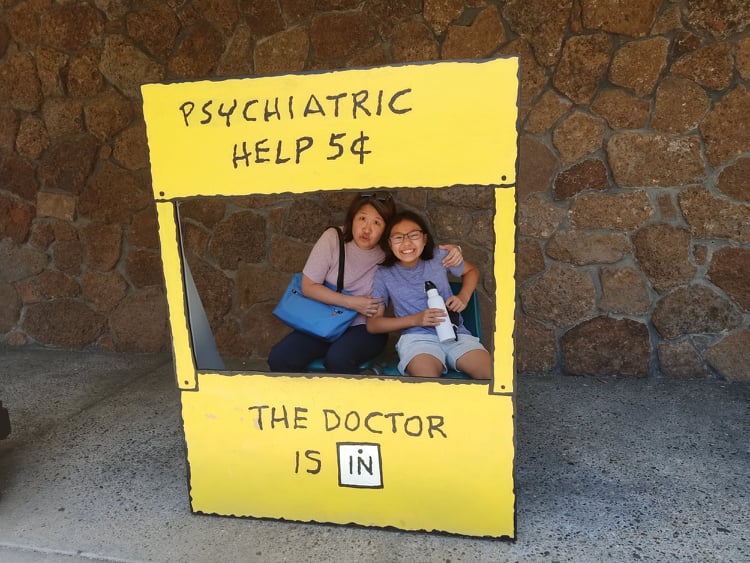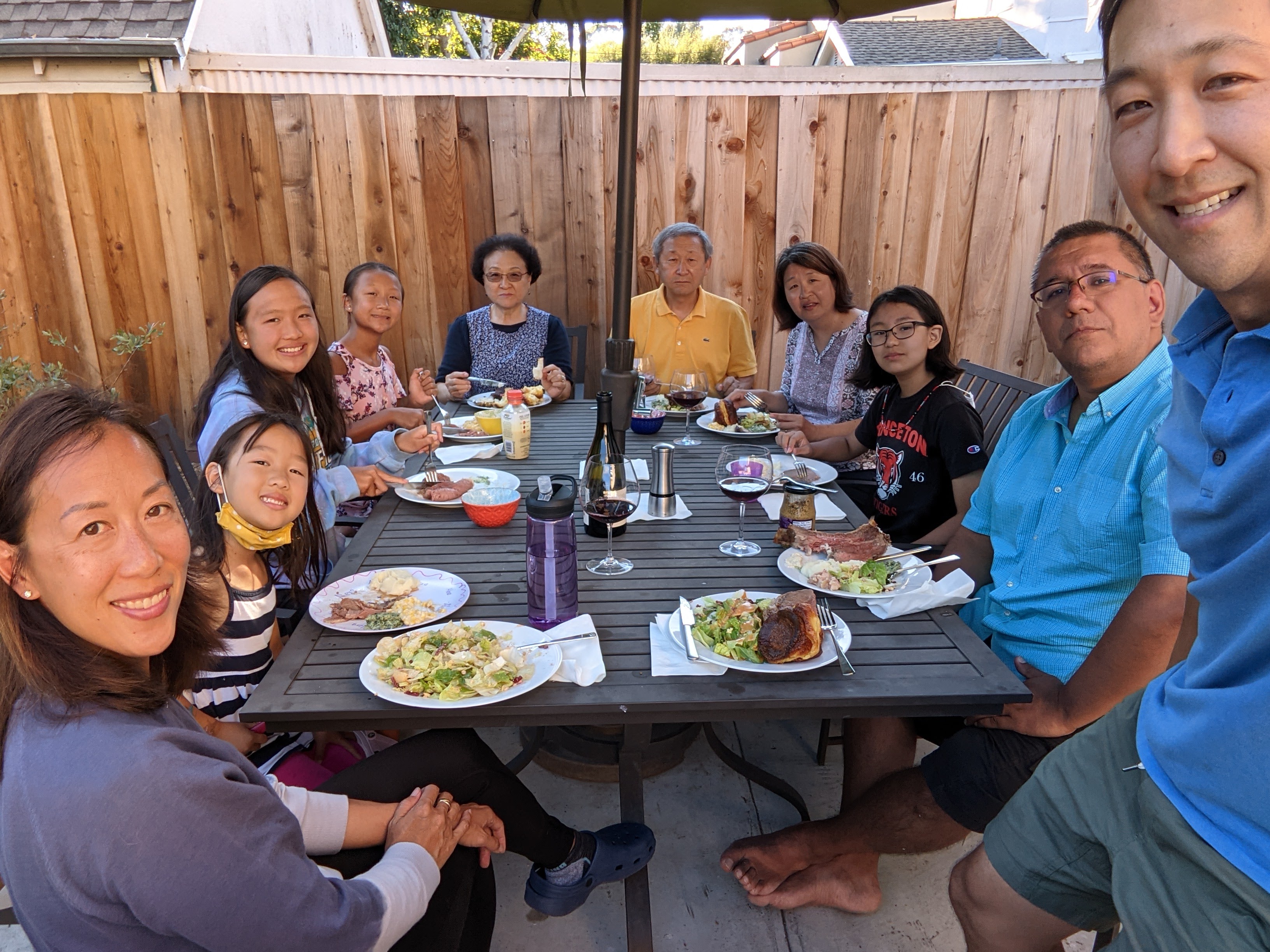A Letter from Cathy Chang and Juan Lopez, serving in the Philippines
Summer 2021
Write to Cathy Chang
Write to Juan Lopez Carrasco
Individuals: Give online to E200533 for Cathy Chang and Juan Lopez’ sending and support
Congregations: Give to D507588 for Cathy Chang and Juan Lopez’ sending and support
Churches are asked to send donations through your congregation’s normal receiving site (this is usually your presbytery)
Subscribe to our co-worker letters
Dear friends and family,
Starting in June 2021, COVID-19 protocols in Quezon City, Philippines, where we live and work, were easing up for most people, especially children. After more than a year of being mandated to stay at home, children could play outside and eat at restaurants with alfresco dining. Thankfully, on our little street, Aurelie learned to play badminton and ride a bicycle. Now our family could enjoy snacks and drinks at a neighborhood café. Our daughter stepped into a neighborhood hair salon for her first not-at-home haircut. Juan and I became fully vaccinated. As foreign nationals (non-Filipino citizens), we could re-enter the Philippines. To be clear, we could always have left the Philippines, but the restrictions prevented us from returning to the Philippines.
Since we couldn’t travel and were working from home during this past year and a half, our family has been watching different kinds of borders. We tried to keep up with what we could and couldn’t do and the places where we could and couldn’t go. We were watching the borders because Juan needed to be on U.S. soil to fulfill his responsibilities as a permanent resident. As parents, we were trying to determine how much screen time was too much when Aurelie, then a third grader, was taking online classes – and trying to stay connected with friends through video games. We were figuring out how to “family time” more meaningfully by deciding which movies to watch: yes to Harry Potter, no to Jurassic Park. I (Cathy) was also trying to make sense of the new work schedule and patterns with Zoom meetings that sometimes started as early as the roosters and pushed the limits of bedtime.
With our eyes firmly fixed on the borders between the U.S. and the Philippines, and with the assistance of immigration attorneys, our family prepared to visit California in mid-July, two days after Aurelie’s last day of class. This past year mostly was weekly family Zoom calls, but now we could experience being in the same room with hugs, meals and summer fun. During one of the last conversations with my (Cathy’s) father before our family flew back to the Philippines, we talked about how I decided to pursue doctoral studies in peacebuilding. This conversation made me realize that I hadn’t fully shared about this topic – so let me do that here.
Throughout this past year, I have witnessed how colleagues pushed against the limitations of banning travel and in-person visits. Some pivoted to carve out and facilitate virtual spaces where we could continue to learn about the challenges of migrants and their families and contribute responses through creative and compassionate collaboration. For example, they created a webinar to explore common ground for African and Asian migrants in the Middle East. They called upon Asian faith community leaders to share about their responses to the pandemic. They created an interfaith prayer video for faith-based communities to incorporate into their worship and meeting spaces.Thankfully, I also experienced new borders of continuing education that enhanced my service as a mission co-worker. An October 2020 trip to Korea with Korean American Presbyterian Clergywomen (KAPCW) was postponed indefinitely. The leadership decided to invite several speakers, whom we would have met during the study trip, to prepare webinars. As a result, I was learning and re-learning about Korean history and current events alongside women in Korea and the United States. Did you know that North and South Korean ecumenical women met before formal government discussions between these two countries? Starting in August 2020, the Innovative Theological Education Program (ITEP) at the Union Theological Seminary of the Philippines was offering several short courses. Before the pandemic, I had appreciated the opportunity to attend in-person consultations, conferences and fora, with many kinds of organizations, to be better informed about the current events in the Philippines, to reflect and network with colleagues. What I had lost by not attending these in-person experiences, I gained through three different ITEP courses about practical ministry, mission theology, and Philippine feminist theology. How does our view of Christ’s death on the cross-influence our views on hospitality and solidarity with people on the margins? Can the church speak out against the idolatry of the caste system in India? How could the babaylan, a pre-colonial community and religious leadership role, empower Filipino women today? Those questions were but a sample of the many with co-learners and facilitators in this new learning environment.
Sometimes taking the longer and more difficult road, Jesus traveled through and confronted many borders and boundaries. Jesus also rebuilt the terms of peace for people on the margins (Samaritan woman), in the religious establishment (Nicodemus) and in the imperial army (Jairus and his daughter). Jesus isn’t the only religious figure doing this work and inspiring peace-loving people around Asia – and I look forward to learning alongside them. Amidst militarism, national security, terrorism, authoritarianism and the ongoing pandemic, I heed Jesus’ call to become a peacebuilder. After discernment over these past few months, I have decided to begin a four-year doctoral program in peacebuilding at Payap University in Chiang Mai, Thailand.
Our family is grateful for your prayerful and financial support that has expanded to include further studies. Together let’s keep on watching the borders, not only for the way things are but for the people whom we can become.
Yours in Christ,
Cathy, Juan and Aurelie
Please read the following letter from Sara P. Lisherness, the interim director of World Mission:
Dear partners in God’s mission,
I don’t know about you, but daily my heart grows heavier. News about the pandemic, wars, wildfires, gun violence, racism, earthquakes and hurricanes cloud my vision. It’s hard to see hope; our world is in a fog. Yet we trust that God’s light and love transcend the brokenness of this time.
God is at work transforming the world, and you, through your prayers, partnership and encouragement, are helping us share this good news. Thank you for your faithful and gracious support of our mission personnel.
How can we see through the fog? What will the church be after the pandemic? Could it be that God is doing “a new thing” and is inviting us to perceive it? Through all the uncertainty we know that God’s steadfast love and care for all creation will prevail and that God’s Spirit is at work in each of us.
We all have an integral part to play in fulfilling God’s mission. As we seek to grow together in faithfulness there are three important steps I invite you to take in supporting our shared commitments to God’s mission:
Give – Consider making a year-end financial contribution for the sending and support of our mission personnel. Your support helps mission personnel accompany global partners as together they share the light of God’s love and justice around the world. Invite your session to include support for mission personnel in its annual budget planning.
Act – Visit The Mission Yearbook for Prayer and Study to delve deeper into the work God is doing through the PC(USA) and its partners in ministry around the globe: pcusa.org/missionyearbook.
Pray – Include our mission personnel, our global partners, and our common commitments to share God’s grace, love, mercy and justice in your daily prayers.
Thank you for your faithfulness to God’s mission through the Presbyterian Church. It is my prayer that you will continue to support this work with your prayers, partnership, and financial gifts in the coming year. We hope you will join us and our partners in shining a beacon of hope throughout the world.
In the light of hope,

Sara P. Lisherness, Interim Director
World Mission
Presbyterian Mission Agency
Presbyterian Church (U.S.A.)
To give please visit https://bit.ly/PCUSAmission
You are the light of the world. A city built on a hill cannot be hid. No one after lighting a lamp puts it under the bushel basket, but on the lampstand, and it gives light to all in the house. In the same way, let your light shine before others, so that they may see your good works and give glory to your Father in heaven. Matthew 5:14-16
![]() You may freely reuse and distribute this article in its entirety for non-commercial purposes in any medium. Please include author attribution, photography credits, and a link to the original article. This work is licensed under a Creative Commons Attribution-NonCommercial-NoDeratives 4.0 International License.
You may freely reuse and distribute this article in its entirety for non-commercial purposes in any medium. Please include author attribution, photography credits, and a link to the original article. This work is licensed under a Creative Commons Attribution-NonCommercial-NoDeratives 4.0 International License.

